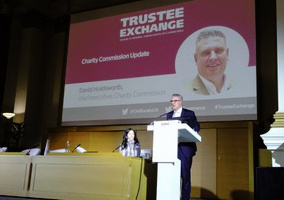Most members of the general public think that either the Charity Commission or the government is responsible for the activities carried out by individual charities, according to data from nfpResearch.
The study, from March this year, found that only 15% of people think that trustees are responsible and accountable for the actions of individual charities, including their direction and strategy.
Meanwhile, 34% of the public thinks that the commission is responsible and 21% thinks that the government is responsible.
The data, shared exclusively with Civil Society, had a sample size of 1,017 people and is a representative sample of the UK population by age, gender and social class.
‘Concerning’ findings
Tim Harrison-Byrne, co-managing director at nfpResearch, told Civil Society that the figures are concerning because “something as important as who runs charities is not clearly understood by the general public”.
He said: “We continue to see how the public doesn't understand how charities work.
“It doesn't understand the importance of the independence of the charity sector, and that people still think the government does all of the things, or the Charity Commission does all of the things that charities are doing.
“Most of us in our lives hear about volunteers, we hear about charity chief executives, but we don't hear that much about trustees, and they're often quite a hidden part of what an organisation does.
“It partly reflects that trustees don't have a very high profile in society, and that's part of the challenge that needs to be faced — that trustees are super important for charities, but the public don't really understand who they are or what they do.”
Joe Saxton, chair of the Association of Chairs, told Civil Society: “We have a lot of work to show the public how important trustees are if we want more members of the public from across society to become trustees.
“This research is helpful for us in understanding the scale of the mountain that we need to climb to get more people to understand who trustees are and why they should become trustees of their local charities or their favourite causes.”
Misunderstanding over trustee pay
This week, commission chief executive David Holdsworth said that voluntary trusteeship was “the linchpin of public trust in charity”.
This followed the regulator’s recent publication of new guidance on trustee payments, which continued to emphasise the voluntary principle of the role.
However, a previous study carried out by nfpResearch in 2023 found that 41% of the public think that trustees are paid.
Harrison-Byrne said: “I've heard the commission say that unpaid trusteeship is important for public trust, but the problem is nobody has told the public that.”
He said he is worried that “the commission is basing some of their strategies on incomplete evidence.”
Saxton said: “We have to start raising the profile of trustees.
“We need to have more famous people who are trustees. George Osborne, our former chancellor, is the chair of the British Museum.
“That's fantastic that he's taking on a charity role like that. The public needs to see more people like him, who are taking on trustee roles and doing that voluntarily.
“We need more role models, more people that the public can identify with, and more people understanding that George Osborne doesn't get paid for being the chair of the British Museum.
“We need the charity sector to publicise it.”
Related articles











